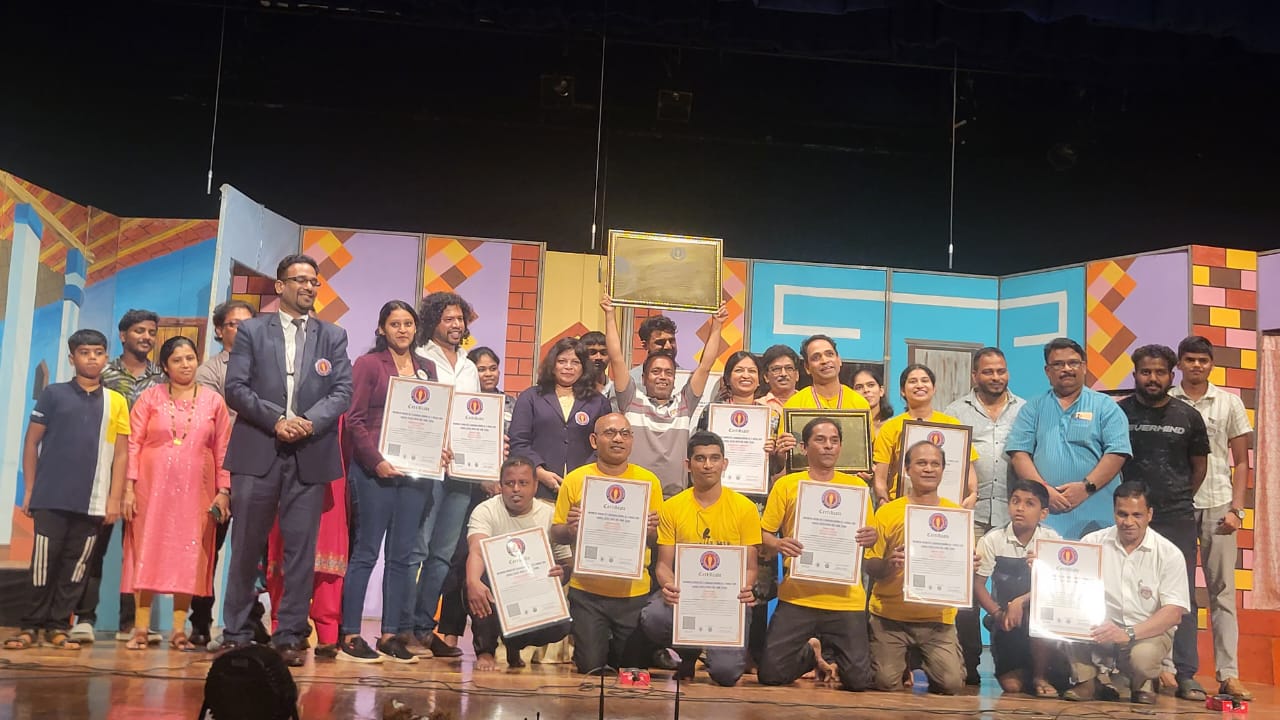
Konkani drama from Goa ‘Ganv Zala Zantto’ made it to the World Records Book of India for making a world record of conducting most shows in a day, along with five-year-old child artist Bhumi Narvekar creating her own world record by performing in all seven shows. All shows were houseful on May 18 at the Ravindra Natya Mandir auditorium, with 1000 seating capacity, and more than 6000 people saw the play, some watching it for the second or third time in a row.
Speaking about this journey to The Goan, actor Rajdeep Naik said, “The idea struck us when we saw a board outside the theatre in Mumbai about a children’s play ‘Albatya Galbatya’ announcing it was their ‘World Record breaking play’. This Marathi play had set the previous world record of staging six shows in a day. We were in Mumbai for performing our first commercial show of ‘Ganv Zala Zantto’ in a theatre there. This board caught our attention, and we kept on discussing about it. We had already staged our show in London, which happened to be the first Konkani drama (not tiatr) in UK.”
On their return journey from Mumbai, as the team sat in the train, the thought again popped up in our minds that why we can’t try to make a world record, said Rajdeep. While in the train, the playwright Suchita Narvekar suggested that ‘Ganv Zala Zantto’ can stage seven shows in a day to break the previous world record, and as soon as the team got off the train at Karmali station in Goa, they began collecting information of how this goal can be achieved, he said.
“We found out about World Records Book of India, got their contact, and conveyed our wish to set a new world record by staging our play for seven consecutive times in a single day. The officials from World Records Book of India, Sanjay Narvekar and Sushma Narvekar informed us about the stringent conditions, rules and regulations, which we had to follow if we wished to break the previous record,” shared Rajdeep.
These conditions were tough, said Rajdeep and added, “They wanted to check our background, know about the storyline and theme. We were told not to make any changes in the theme. All shows should have the same script, same artists, same technical team and each show should be performed with the same energy levels, till the last show. And the registration fee was Rs 80,000 which we had to pay.”
The play was of two hours, so the team planned meticulously, and prepared accordingly, both physically and mentally. The times were set for the shows – beginning the first show at 7.30 am in the morning and strictly ending at 9.30 am. The following shows were at 10 am to 12 noon, 12.30 to 2.30 pm, 3 to 5 pm, 5.30 to 7.30 pm, 8 to 10 pm and 10.30 pm to 12.30 am. The artists took a break of half an hour, avoiding completely outside food.
“We kept ourselves hydrated with coconut water, fruit juices, nachani satva, pej etc. A doctor was kept ready and an ambulance in case any artist needed it. There was risk to our health, but we took all necessary precautions. And with God’s grace, we made it. The audience was there to support us throughout the seven shows. Even the balcony at the Ravindra Natya Mandir had to be opened to make sitting arrangement for the audience. We were overwhelmed by the love our Goan audience showed. Some came for the first show at 7.30 am, thinking what if there are no audiences in the hall to give moral support,” recalls Rajdeep and names Reena Lohia, wife of one of the actors, Rajesh Lohia, who played the role of mother, sister, daughter to the team, literally fed all the artists in the breaks.
Rajdeep thanks Umesh Naik, Kiran Kakodkar, Laxmidas Naik, Vitthal Naik and director Amogh Budkule who was there for all the shows. He also thanks Encore Academy of Performing Arts for their support.